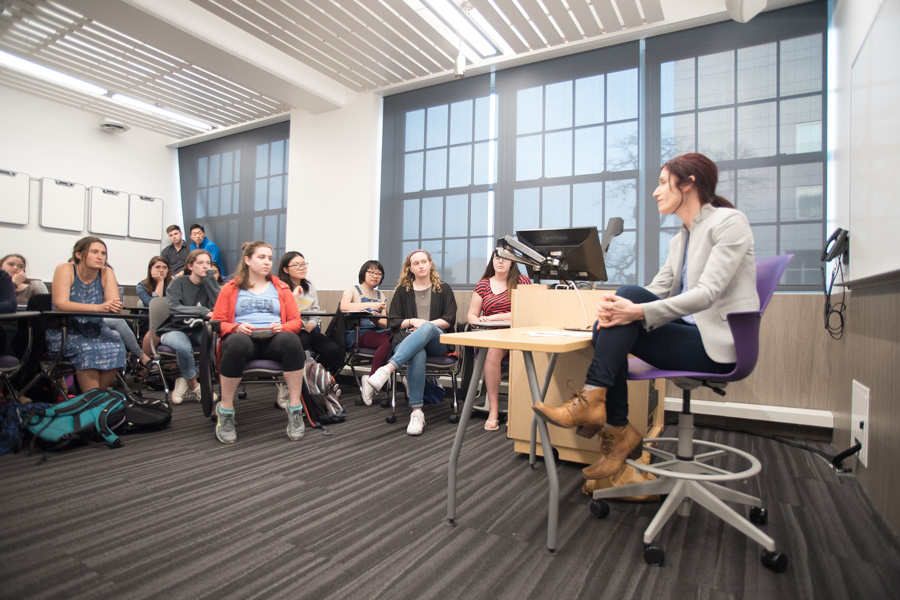Northwestern professor discusses law reforms to support sexual assault survivors
Colin Boyle/Daily Senior Staffer
Pritzker School of Law Prof. Deborah Tuerkheimer speaks at an event in Kresge Hall on Tuesday. The event, titled “Rape Law in Flux,” focused on her work in sexual assault law reform.
April 25, 2017
Pritzker School of Law Prof. Deborah Tuerkheimer spoke Tuesday about law reforms that are necessary to increase support for sexual assault survivors as a guest speaker for Take Back the Night.
Tuerkheimer, who previously worked in the Special Victims Bureau of the Manhattan District Attorney’s office as a prosecutor, addressed nearly 40 people in Kresge Hall at an event hosted by Northwestern’s College Feminists. The talk was part of programming for this year’s Take Back the Night, a week centered on sexual assault awareness and supporting survivors.
Tuerkheimer spoke about her experiences reforming sexual misconduct laws with the American Law Institute, an organization that works with judges, lawyers and academics to improve law. She has been helping ALI refine the Model Penal Code’s sexual assault provisions, which haven’t been updated in decades, she said. A revision of the Model Penal Code will help legislatures update and standardize the United States’ penal code.
TBTN co-chair Sarah Van Cleve said the group invited Tuerkheimer, who spoke at the event last year, to return because of current political debates surrounding rape law and protection for survivors.
“We were mostly inspired by the current political arena, especially when we’re talking about the election and what way we can move forward and relating that to our week,” the Medill junior said. “We thought Prof. Tuerkheimer had a great combination of looking both from the national political side and what’s been going on on campus.”
Tuerkheimer said even today, a majority of states only deem assault as rape if an “adequate amount of force” is used, regardless of whether the victim consented. Laws that include consent as the main requirement do so in a non-affirmative sense — “no means no” — rather than in an affirmative sense, “only yes means yes,” she said.
She is working with ALI to create an affirmative definition of consent, but even defining consent is challenging, she said. Biases in law enforcement and ineffective enforcement of rape laws by police officers makes implementing changed policies even more difficult, she said.
“The law has been really deeply skeptical of rape accusers, who are mostly women, but certainly not all women,” Tuerkheimer said. “I title this talk ‘Rape Law in Flux’ because we’re at a crossroads right now.”
She also discussed her work for the Project on Sexual and Gender-Based Misconduct on Campus. The project works with higher education administrators to produce a document on how to handle student-on-student sexual misconduct on campus.
Weinberg junior Kevin Pu, president of Men Against Rape and Sexual Assault, attended the event and said learning about the legal aspects of sexual assault is important, especially for people supporting survivors.
“Learning about these things from a legal perspective is something that the people who are not the primary or most dominant victims of sexual assault or sexual violence should be learning about,” Pu said. “It’s one way to defend and support survivors … whether or not you’re going into law.”
Correction: A previous version of this story misstated when Deborah Tuerkheimer last spoke at a Take Back the Night event. Tuerkheimer was invited two years ago. The Daily regrets the error.
Email: [email protected]
Twitter: @sophiemmann


